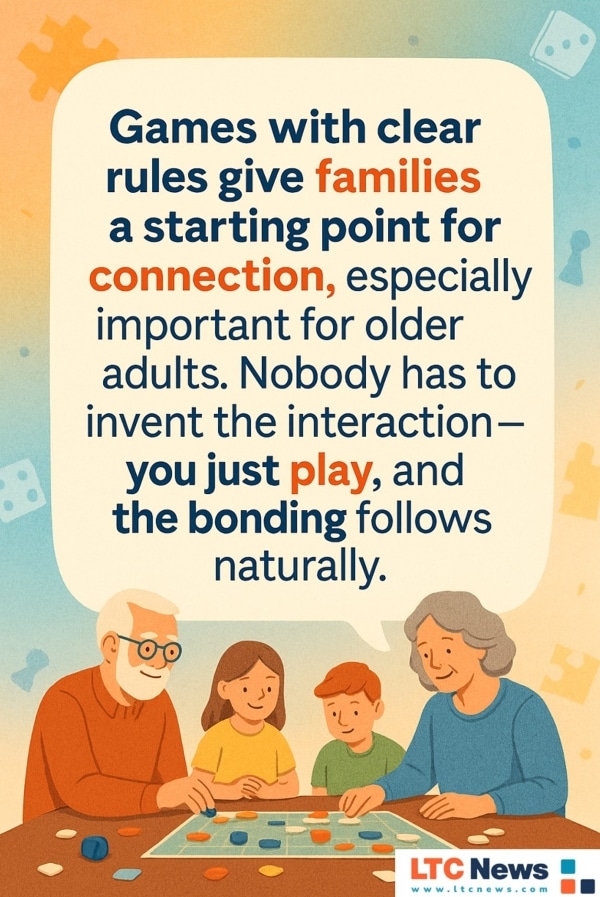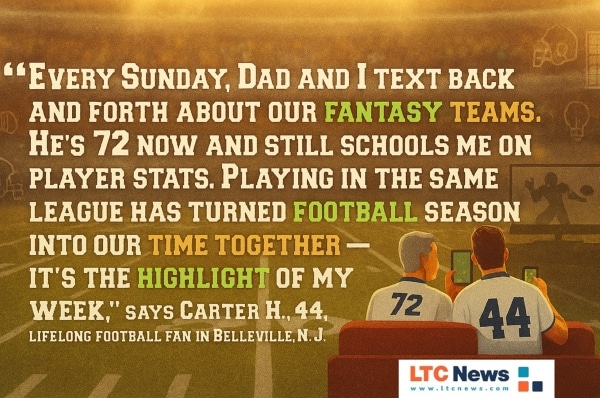Bridging Generations: How Shared Hobbies Keep Families Connected

Table of Contents
- Power of Shared Activities
- Time-Tested Hobbies That Bring Families Together
- Board Games, Sports, and Recreation
- Digital Hobbies That Close the Gap
- Turning Activities into Traditions
- Combining Technology with Traditional Passions
- Fantasy Football as an Intergenerational Connection
- Shared Hobbies and Long-Term Well-Being
- Shared Hobbies in Senior Living Communities
- How to Get Started
- Building a Legacy of Connection
You probably feel it already — it’s harder than ever to stay close to family. Everyone is busy, distracted by phones and streaming services. Yet you want meaningful time with your adult children, grandchildren, or aging parents. Shared hobbies give you a simple way to make that happen.
Staying connected really does matter. According to a 2023 Generations United report, 92% of Americans who take part in intergenerational activities say it improves their relationships and sense of purpose. For older adults, these activities also reduce loneliness and support cognitive health.
Power of Shared Activities
Before you pick a hobby, it helps to understand why these activities work. When you and your family do something together, you’re doing more than passing time — you’re building a bridge.
Shared hobbies foster communication, teach skills, and reduce stress for everyone involved. They also give you a predictable, positive reason to gather even during busy seasons.
Here’s what happens when you engage together:
- Spark real conversations. Activities naturally lead to talk, laughter, and problem-solving.
- Transfer skills and stories. Grandparents pass down life lessons; younger relatives share new trends.
- Boost emotional well-being. Participating together lowers stress and increases a sense of belonging.
Time-Tested Hobbies That Bring Families Together
Classic activities offer a comfortable starting point for building intergenerational bonds. They’re familiar, low-cost, and rich in opportunities for teaching and sharing.
You may already do some of these on your own — the difference is inviting family to join you.
- Gardening. Teach kids or grandkids about plants and sustainability.
- Fishing trips. Quiet time at the lake invites heartfelt talks and skill-sharing.
- Cooking. Make family recipes together to preserve culture and memories.
- Music swaps. Share your favorite hits from the 1960s and 1970s while discovering your grandkids’ playlists.
Each of these activities blends fun with meaningful connection.
Board Games, Sports, and Recreation
Activities that have a built-in set of rules or a clear format — like board games or organized sports — make it easier for you and your family to spend quality time together. This type of structured play simply means that everyone knows how to participate, what the objective is, and how the game or activity concludes.
That structure removes the awkwardness of figuring out what to do and creates a safe, predictable way for different generations to interact.
Board games, puzzles, and recreational sports invite both collaboration and friendly competition. They also help you step away from screens and focus on each other. Board games challenge older adults to think strategically, while children learn patience and teamwork. Recreational sports like pickleball, softball, or bowling provide movement and shared milestones.
Even cheering for the same local team creates a bond and memories tied to wins and losses.

Digital Hobbies That Close the Gap
Digital activities don’t have to feel intimidating. In fact, they’re one of the easiest ways to meet younger family members where they are. From online trivia nights to fantasy sports leagues or virtual book clubs, digital hobbies bring you closer across miles and generations.
If you’re unsure how to start, ask younger relatives to help you set up an app or show you the ropes. This openness signals respect for their interests and keeps you engaged in family conversations.
Turning Activities into Traditions
One-time activities are good, but traditions are great. When a hobby becomes a tradition, it gains emotional weight and becomes part of your family’s story. Predictability also helps children and grandchildren look forward to regular time with you.
You can:
- Host a monthly board game night with rotating hosts.
- Plant a family garden each spring and document its progress.
- Plan an annual fishing or hiking trip that everyone anticipates.
Traditions create milestones, anchor memories, and ensure that bonding happens regularly.
Combining Technology with Traditional Passions
Mixing modern tools with classic hobbies is an easy way to stay current and deepen your experience. By blending the familiar with the new, you also create common ground for conversation.
Gardening apps track plant growth, fishing apps identify optimal spots, and collaborative playlists let everyone contribute songs. These small tech upgrades make activities easier and more fun — and give you a shared language with younger relatives.
Fantasy Football as an Intergenerational Connection
If you’re a football fan, fantasy football can be more than just a game — it can be a bridge to your kids or grandkids. Many adult children already play in leagues with friends, and inviting an older parent into the mix creates a shared experience that lasts all season.
Whether you’re a retiree who’s followed the NFL for decades or a newcomer who just enjoys Sunday games, fantasy football gives you and your family a reason to text, call, and strategize week after week.
The game is no longer a niche hobby. According to the Fantasy Sports & Gaming Association (FSGA), more than 62.5 million people in the United States and Canada played fantasy sports in 2023 — up from just 15 million in 2003. Fantasy football is the largest segment, accounting for about 80% of all fantasy sports participation.
Growth is especially strong among women, retirees, and families playing in private leagues. Today, players age 45 and older represent one of the fastest-growing groups, as digital platforms become easier to use and more inclusive.
Playing together blends competition with collaboration. Sons, daughters, and even grandchildren can help an older parent draft players, track stats, or navigate league apps. Meanwhile, the older parent brings decades of football knowledge, stories about legendary games, and maybe even a few “back in my day” anecdotes that enrich the experience for younger family members.
There are even online tools, like a fantasy football draft assistant, that can help retirees participate confidently alongside younger family members
This shared hobby also makes technology less intimidating. Most fantasy platforms offer mobile apps, alerts, and chat features that keep everyone in touch between games. For retirees, learning to manage a fantasy roster can build confidence with technology, keep the brain sharp, and provide a weekly burst of social interaction — especially valuable for those living alone or in senior communities.

Share your thoughts and experiences about aging, caregiving, health, retirement, and long-term care with LTC News —Contact LTC News.
If you’re looking for an easy on-ramp, consider starting with a family league that meets in person for draft day or sets up a video call. Those rituals — picking players, debating trades, or watching Sunday games together — become modern family traditions, turning football season into a true intergenerational event.
Shared Hobbies and Long-Term Well-Being
Shared hobbies aren’t just good for your relationships — they’re an investment in your health and independence. When you stay physically active, socially connected, and mentally stimulated, you lower your risk for depression, mobility decline, and cognitive impairment as you age.
Those benefits don’t stop with you. Adult children and grandchildren who participate in activities with older relatives also show better empathy, stronger family attachment, and healthier coping skills.
A growing body of evidence backs this up. The National Institute on Aging reports that older adults who engage in regular social and leisure activities have better memory, mood, and physical function than those who are isolated. Activities that combine movement with social interaction — such as dancing, gardening, or group walks — can even improve balance and cardiovascular health while reducing stress hormones.
You can also think of shared hobbies as “practice” for successful aging. By nurturing your mind and body, you may delay the need for more intensive care, and when care becomes necessary, your stronger social network can ease the transition. For adult children, participating in activities now gives you a deeper understanding of your parents’ abilities and preferences, which can inform future care planning.

Shared Hobbies in Senior Living Communities
Even if your loved one lives in assisted living, memory care, or a nursing home, you can still maintain — and even strengthen — your connection through shared activities. In fact, these settings often provide structured opportunities and supportive environments that make intergenerational hobbies easier. Visits filled with meaningful interaction can improve mood, reduce agitation in residents with dementia, and give families a sense of purpose.
Most senior living communities host activity calendars that include gardening clubs, cooking demonstrations, art workshops, music sessions, and game nights. You can participate alongside your parent or grandparent during these events or bring your own favorite activity to share.
For example, bringing in a beloved family recipe to cook with your parent in the community kitchen or setting up a board game in a common room can spark conversation and nostalgia.
If your loved one is in memory care, sensory activities such as familiar music, simple art projects, or planting herbs in small pots can evoke positive memories and provide comfort. According to the Alzheimer’s Association, familiar, low-stress activities help reduce anxiety and stimulate cognitive function for people living with dementia.
Using digital tools can help too. Even in nursing homes, a tablet or laptop can let you and your loved one enjoy online trivia, watch old family videos, or create digital photo albums together. Many communities now offer Wi-Fi and tech support, making it easier to bridge the distance if you live far away.
Professional caregivers point out that when families engage in meaningful activities with care recipients in a long-term care facility, it’s not just a visit — it’s therapy. Shared hobbies lift spirits, improve cognitive stimulation, and create a sense of belonging.
How to Get Started
Beginning something new can feel intimidating, but it’s easier than you think. Start by talking with your family, then choose an activity that excites everyone. Remember — this is about connection, not perfection.
You can:
- Ask your family what excites them. You might be surprised by their answers.
- Begin small. One hobby at a time is easier than overhauling your schedule.
- Stay flexible. Let your children or grandchildren teach you a new skill.
- Use local resources. Parks, libraries, and community centers often offer intergenerational programs.
Start with curiosity. Ask your family what they’d like to do, then meet them halfway. You’ll learn new things about them — and yourself.
Building a Legacy of Connection
Your hobbies can become your family’s traditions and your legacy. When you model curiosity and participation, you teach your kids and grandkids that relationships matter. Whether it’s cooking Sunday dinners, building a garden, or sharing playlists, these shared experiences weave your family closer together.
Key Takeaway: You can’t stop time, but you can choose how to spend it. Shared hobbies give you a powerful, joyful way to stay connected across generations, improve your health, and create memories that last.
As you build that bond with an older loved one, are you prepared for the impact aging and long-term care will have on your family and finances? Learn how Long-Term Care Insurance can be a significant part of your retirement plan - LTC News Long-Term Care Insurance Education Center.


